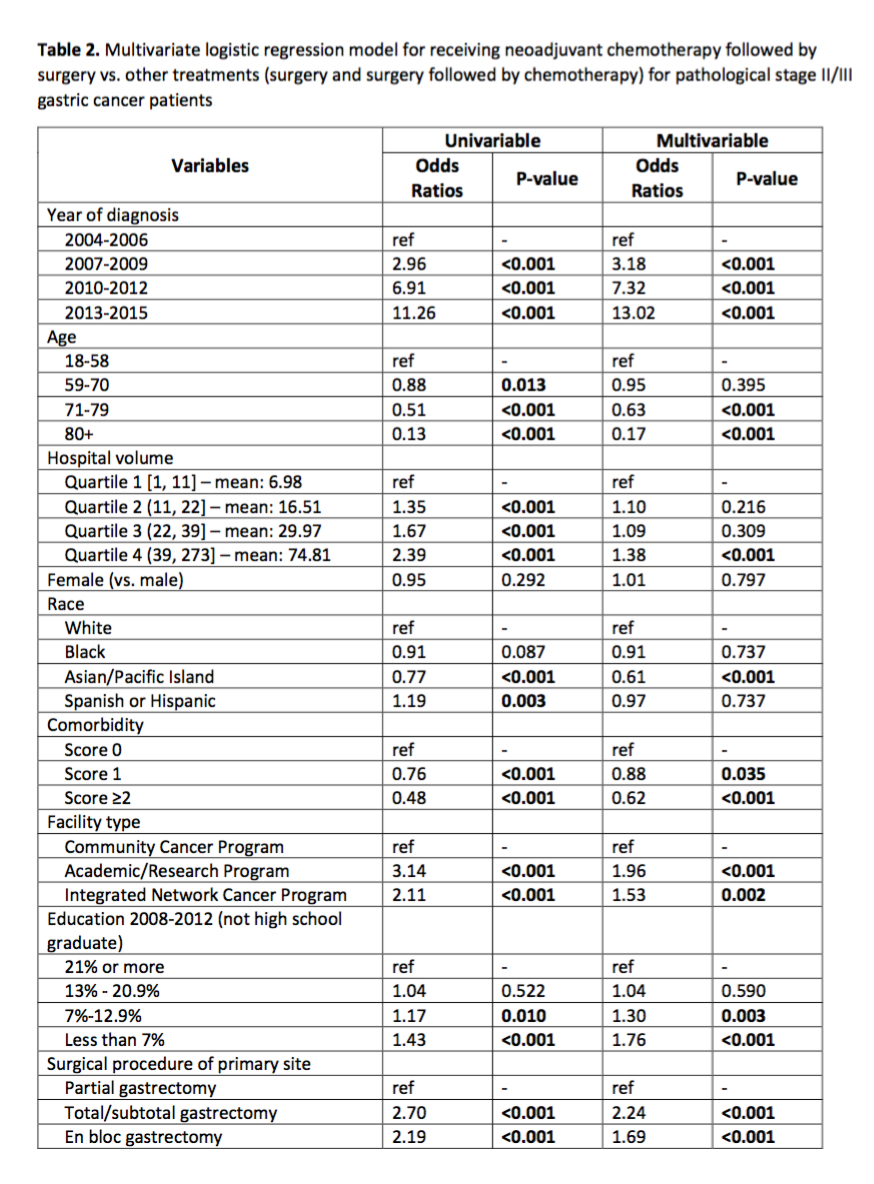NATIONAL UNDERUTILIZATION OF MULTIMODALTIY TREATMENT FOR GASTRIC CANCER
Natalie Liu*, Yiwei Xu, Amir A. Rahnemai-Azar, Daniel E. Abbott, Sharon M. Weber, Anne O. Lidor
Department of Surgery, University of Wisconsin, Madison, WI
Background: While the incidence of gastric cancer has declined, it remains the fourth most common and second most deadly cancer worldwide, with 5-year survival of only 30%. Since the publication of the landmark MAGIC trial in 2006, perioperative chemotherapy has become the standard of care for stage II/III gastric cancer. Nevertheless, many patients still do not begin their treatment with neoadjuvant chemotherapy. Therefore, the objective of our study was to identify factors associated with underutilization of neoadjuvant chemotherapy for stage II/III gastric cancer.
Methods: Patients with pathological stage II and III primary gastric cancer between 2004-2015 were identified from the American College of Surgeons National Cancer Database (NCDB). Patients who received neoadjuvant chemotherapy followed by surgery were compared to those who underwent surgery only or surgery followed by chemotherapy. Predictors of receipt of neoadjuvant chemotherapy were identified using multivariable logistic regression model. Associations between treatment strategy and overall survival were examined using the Cox proportional hazard model.
Results: We included 15,947 patients with pathological stage II and III gastric cancer. Before 2006, less than 5% of patients received neoadjuvant chemotherapy and surgery. After 2006, the proportion of patients receiving neoadjuvant chemotherapy increased, yet by 2015, more than 70%% of patients did not receive neoadjuvant chemotherapy and surgery (Table 1). On multivariate analysis, factors associated with no receipt of neoadjuvant therapy included treatment year before 2006, age greater than 80, lower hospital volume, increased comorbidities, and lower education levels (Table 2). Treatment at academic research programs or integrated network cancer programs and undergoing total/subtotal or en bloc gastrectomy predicted receipt of neoadjuvant chemotherapy. On Cox hazard regression analysis, there was an association with improved survival in patients who received neoadjuvant chemotherapy and surgery compared to surgery only patients.
Conclusions: Ten years after the publication of the MAGIC trial, less than 1/3 of patients with stage II/III gastric cancer are receiving neoadjuvant chemotherapy followed by surgery, which has been shown to improve disease-specific survival., Further studies and interventions are needed to alleviate these disparities and ensure both patients and providers are having evidence-based discussions about multimodal therapy for gastric cancer.
Table 1. Treatment type by year of pathological stage II and III gastric cancer
Table 2. Multivariate logistic regression model for receiving neoadjuvant chemotherapy followed by surgery vs. other treatments (surgery and surgery followed by chemotherapy) for pathological stage II/III gastric cancer patients
Back to 2019 Abstracts




